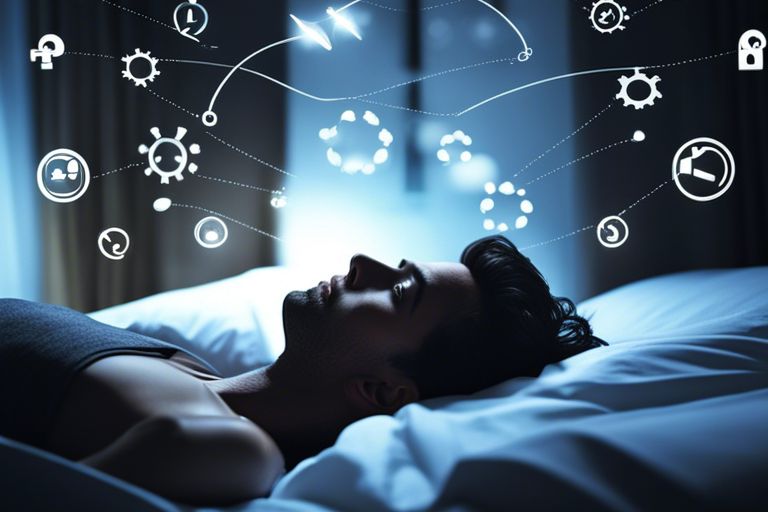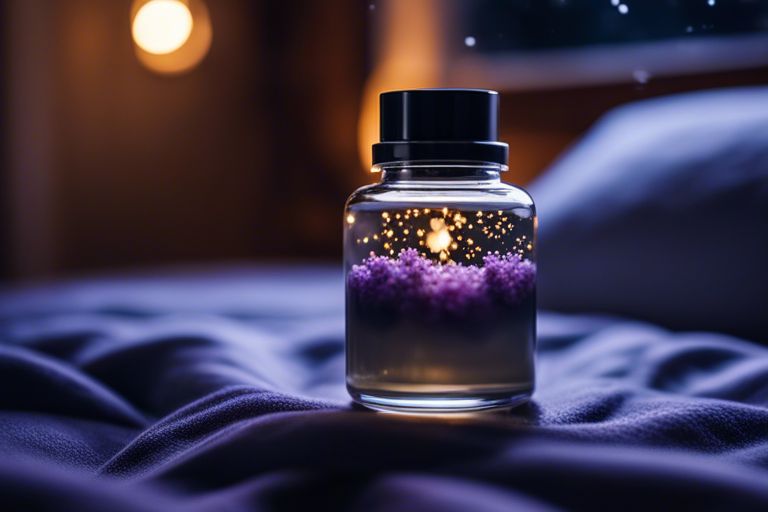It’s no secret that anxiety and insomnia often go hand in hand, with one frequently exacerbating the other. Understanding why certain anxiety-inducing situations can lead to sleepless nights is crucial in addressing this common issue. By exploring the connection between anxiety triggers and insomnia, we can develop strategies to manage and reduce the impact of these situations on our sleep quality.
Key Takeaways:
- Anxiety-inducing situations can trigger insomnia: Stress and anxiety can disrupt sleep patterns, making it harder to fall and stay asleep.
- Hyperarousal response: When faced with a stressful situation, the body can enter a state of hyperarousal, leading to increased heart rate, alertness, and difficulty winding down for sleep.
- Racing thoughts: Anxiety can cause racing thoughts and worry, making it challenging to quiet the mind and relax enough to fall asleep.
- Physical symptoms: Anxiety can also manifest in physical symptoms such as muscle tension, restlessness, and increased agitation, further hindering sleep.
- Nighttime wakefulness: Anxiety-induced insomnia may cause frequent awakenings during the night or difficulty returning to sleep after waking up.
- Strategies to manage anxiety-induced insomnia: Practicing relaxation techniques, establishing a bedtime routine, and addressing underlying anxiety through therapy or medication can help alleviate insomnia triggered by anxiety.
- Seek professional help: If anxiety-induced insomnia persists and significantly impacts your daily life, it is important to seek help from a healthcare provider or mental health professional for proper evaluation and treatment.
The Connection Between Anxiety and Sleep Disturbances
If you’ve ever found yourself tossing and turning at night due to anxiety, you’re not alone. The relationship between anxiety and insomnia is a complex one that can have significant effects on your sleep quality and overall well-being. Understanding the factors linking anxiety to insomnia can help you address and manage these issues effectively.
Biological Factors Linking Anxiety to Insomnia
If you struggle with anxiety, you may be more susceptible to experiencing insomnia due to a variety of biological factors. One key factor is the overactivation of the hypothalamic-pituitary-adrenal (HPA) axis, which is responsible for the body’s stress response. This heightened activation can lead to increased levels of the stress hormone cortisol, disrupting your sleep-wake cycle and making it difficult to fall and stay asleep. Additionally, individuals with anxiety may have imbalances in neurotransmitters such as serotonin and gamma-aminobutyric acid (GABA), which play crucial roles in regulating mood and sleep.
- Anxiety can lead to overactivation of the HPA axis
- Heightened cortisol levels can disrupt the sleep-wake cycle
- Imbalances in neurotransmitters like serotonin and GABA may impact sleep quality
Perceiving even minor stressors as threats can keep the body in a state of hyperarousal, making it challenging to relax and fall asleep. By addressing these biological factors through therapeutic interventions or lifestyle changes, individuals with anxiety can improve their sleep outcomes and overall quality of life.
Psychological Aspects That Influence Sleep Quality
The relationship between anxiety and insomnia extends beyond biological factors to include psychological aspects that can significantly impact sleep quality. Racing thoughts, worries, and intrusive images associated with anxiety can keep the mind active and prevent relaxation before bedtime. This mental hyperactivity can interfere with the process of transitioning from wakefulness to sleep, leading to difficulties in initiating and maintaining restful sleep.
The persistent cycle of rumination and negative thought patterns commonly seen in anxiety disorders can contribute to a heightened state of arousal that makes it challenging to unwind and enter a restful sleep state. Addressing these psychological aspects through cognitive-behavioral therapy or relaxation techniques can help individuals with anxiety cultivate a more peaceful mindset and improve their sleep hygiene.
Biological and psychological factors interplay in a complex manner to influence the relationship between anxiety and insomnia. By recognizing and addressing these factors, individuals can take proactive steps towards mitigating the impact of anxiety on their sleep quality and overall well-being.
Common Anxiety-Inducing Situations That Lead to Insomnia
Some anxiety-inducing situations can trigger insomnia, making it difficult for individuals to fall asleep or stay asleep throughout the night. Understanding these common triggers can help individuals better manage their anxiety and improve their sleep quality.
Stressful Life Events and Responsibilities
Responsibilities such as work deadlines, financial struggles, or family issues can create high levels of stress and anxiety, leading to insomnia. The pressure to meet expectations and handle multiple tasks can overwhelm the mind, making it challenging to relax and unwind before bedtime. This can result in racing thoughts, restlessness, and difficulty falling asleep.
Moreover, major life events such as moving to a new city, starting a new job, or going through a breakup can also contribute to heightened anxiety levels, disrupting the sleep-wake cycle. The combination of emotional distress and uncertainty about the future can exacerbate insomnia symptoms, impacting overall well-being.
Fear of the Future and Uncontrolled Thoughts
Any fear of the unknown or uncertainty about the future can fuel anxiety and sleep disturbances. Constantly worrying about what lies ahead or feeling overwhelmed by uncontrolled thoughts can keep the mind in a state of hyperarousal, making it challenging to relax and fall asleep. This fear of the future can manifest as catastrophic thinking or irrational beliefs, further intensifying insomnia symptoms.
Plus, the fear of the future and uncontrolled thoughts can lead to a vicious cycle of anxiety and sleeplessness, impacting both mental and physical health. Breaking this cycle involves addressing underlying anxiety triggers, practicing relaxation techniques, and seeking professional help if needed to improve sleep quality and overall well-being.
Coping Mechanisms and Their Impact on Sleep Patterns
Not all coping mechanisms are created equal when it comes to dealing with anxiety-induced insomnia. The strategies individuals use to manage their stress can significantly impact their sleep patterns. In this chapter, we explore how healthy coping strategies can mitigate insomnia, as well as counterproductive behaviors that may aggravate sleeplessness.
Healthy Coping Strategies to Mitigate Insomnia
Patterns of behavior that promote relaxation and calm can help individuals manage anxiety and improve their sleep quality. Engaging in activities such as deep breathing exercises, mindfulness meditation, and progressive muscle relaxation before bedtime can significantly reduce the impact of anxiety on sleep. Additionally, maintaining a consistent bedtime routine and creating a comfortable sleep environment can contribute to better sleep hygiene.
Utilizing positive coping mechanisms like exercise, social support, and journaling can also aid in reducing anxiety levels and promoting restful sleep. By addressing the root causes of anxiety and implementing healthy coping strategies, individuals can positively influence their sleep patterns and overall well-being.
Counterproductive Behaviors That Aggravate Sleeplessness
That said, some coping mechanisms can inadvertently worsen insomnia symptoms. Behaviors such as excessive alcohol consumption, consuming stimulants like caffeine late in the day, and excessive screen time before bed can disrupt the body’s natural sleep-wake cycle. These counterproductive habits exacerbate anxiety and make it more difficult to fall asleep or stay asleep throughout the night.
To address these counterproductive behaviors, individuals should actively work on replacing them with healthier alternatives. By making small changes to their daily routines and avoiding triggers that worsen anxiety, individuals can create a more conducive environment for restful and restorative sleep.

Practical Tips for Managing Anxiety and Improving Sleep
Many individuals who struggle with anxiety find that it greatly impacts their ability to get a good night’s sleep. The two are often intertwined, with anxiety causing insomnia and lack of sleep exacerbating feelings of anxiety. If you are dealing with this challenging cycle, it is important to address both issues simultaneously to improve your overall well-being.
Relaxation Techniques and Sleep Hygiene
The first step in managing anxiety-induced insomnia is to incorporate relaxation techniques into your daily routine. Deep breathing exercises, progressive muscle relaxation, and mindfulness meditation can help calm your mind and body, making it easier to fall asleep. Additionally, establishing a healthy sleep hygiene routine is crucial. This includes maintaining a consistent sleep schedule, creating a relaxing bedtime routine, and ensuring your sleep environment is comfortable and conducive to restful sleep.
Professional Treatment Options and When to Seek Help
Hygiene It is important to recognize that sometimes anxiety and insomnia may require professional treatment. If your symptoms persist despite trying self-help strategies, it may be time to seek help from a mental health professional. Cognitive-behavioral therapy (CBT) has been shown to be highly effective in treating both anxiety and insomnia. In some cases, medication may be prescribed to help manage symptoms, but this should always be done under the guidance of a healthcare provider.
Treatment Bear in mind, it is not a sign of weakness to seek help for your anxiety and sleep difficulties. In fact, it takes strength and courage to confront these challenges and take steps to improve your mental health. Ignoring the issue will not make it go away, so don’t hesitate to reach out for support if you need it.
To wrap up
Drawing together the complex relationship between anxiety-inducing situations and insomnia, it is clear that heightened stress levels can disrupt the body’s natural sleep patterns. When faced with anxiety-provoking circumstances, the body enters a state of alertness that makes it difficult to ease into a restful sleep. As a result, individuals may experience difficulties falling or staying asleep, leading to insomnia. By addressing and managing anxiety through various coping mechanisms such as relaxation techniques and therapy, individuals can work towards improving their sleep quality and overall well-being.
FAQ
Q: Why do some anxiety-inducing situations trigger insomnia?
A: Anxiety can lead to insomnia due to the overactivation of the body’s stress response, which can interfere with the ability to fall asleep and stay asleep. When faced with anxiety-inducing situations, the body releases stress hormones like cortisol, making it difficult to relax and transition into a state conducive to sleep.
Q: What are some common anxiety-inducing situations that may trigger insomnia?
A: Common anxiety-inducing situations that may trigger insomnia include work-related stress, relationship problems, financial worries, health concerns, traumatic events, and major life changes. These situations can lead to racing thoughts, increased heart rate, and muscle tension, all of which can disrupt sleep patterns.
Q: How does anxiety affect the quality of sleep in individuals experiencing insomnia?
A: Anxiety can significantly impact the quality of sleep by causing individuals to experience difficulties falling asleep, frequent awakenings during the night, or early morning awakenings. This fragmented and restless sleep can result in feelings of fatigue, irritability, and decreased cognitive function the following day.
Q: What are some strategies to manage anxiety-induced insomnia?
A: Strategies to manage anxiety-induced insomnia include practicing relaxation techniques such as deep breathing, progressive muscle relaxation, mindfulness meditation, establishing a consistent bedtime routine, limiting caffeine and electronic device use before bed, creating a comfortable sleep environment, and seeking support from a therapist or counselor.
Q: When should someone seek professional help for anxiety-induced insomnia?
A: If anxiety-induced insomnia persists for more than a few weeks and significantly impacts daily functioning, it is important to seek professional help. A healthcare provider or mental health professional can assess the underlying causes of insomnia, provide guidance on proper treatment options, and offer support to improve sleep quality and overall well-being.



